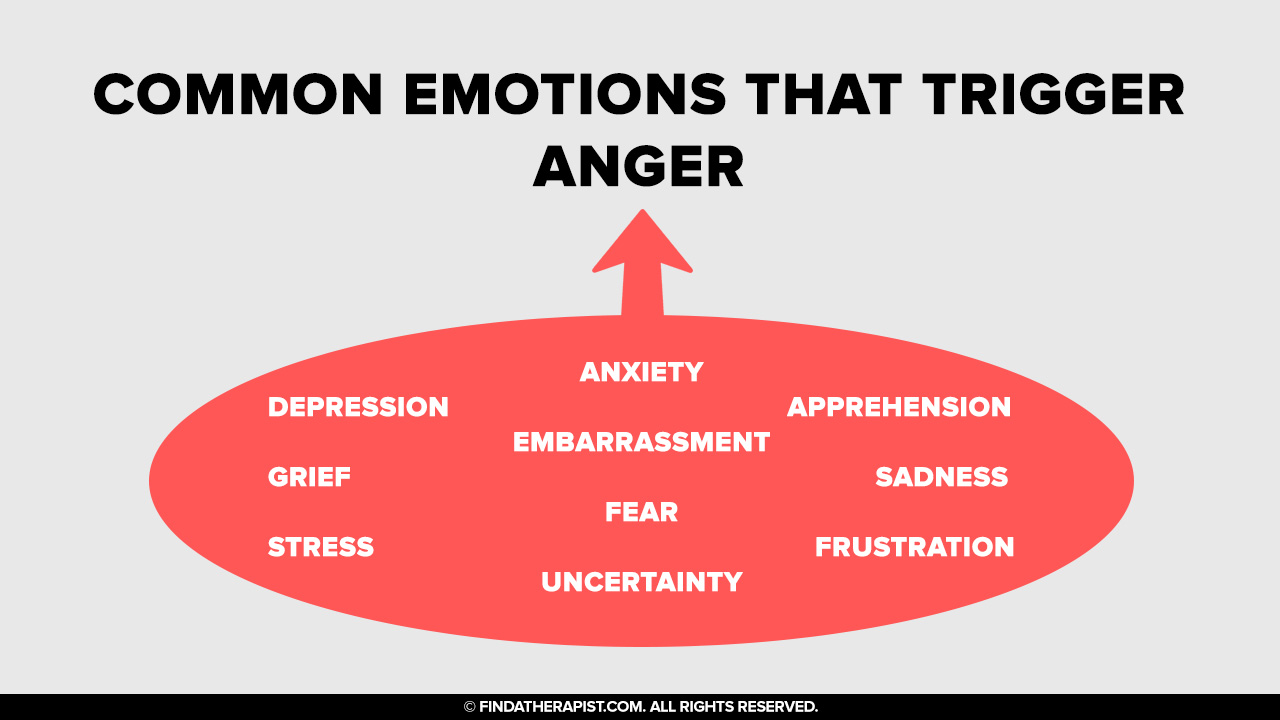What Is Anger? A Secondary Emotion
Published on October 17th, 2019
Updated on January 3rd, 2024

Anger is a complicated emotion. It is an emotion that has a profound effect on a person, and the people around that person. Anger causes us to act in ways we may not be proud of, and can cause us to make mistakes in our lives that we may regret. Anger can be difficult to control at times, and it has the potential to cause controversy and other complications in life.
When you do not understand your anger or how to control your anger, it can be hard to not act out in destructive ways. Without proper emotional regulation skills, anger can cause us to act out in ‘rage’, which is the behavior that comes from anger. Rage is a powerful force, and can be very destructive and painful for you and the people around you. It typically makes difficult situations worse, and causes a great deal of unrest in your life.
It can be challenging to control your anger and rage, especially in the moment. In the moment of feeling anger and wanting to act out in rage, resisting the temptation can be extraordinarily difficult. At the same time, not understanding your anger can cause you to not understand the underlying issue that is causing you to be angry.
Sponsored by

Choose a therapist to work with and start healing with 20% off from BetterHelp.
Click HereThe first step toward understanding your anger is understanding what it means to be angry. Anger rarely ever happens on its own. It is considered a secondary emotion.
Anger: A Secondary Emotion
In the world of psychology, anger is considered a secondary emotion. A secondary emotion is an emotion that is fueled by other emotions. What this means is that when a person is feeling angry, they are also feeling other emotions that are causing them to feel angry.
Typically, someone will feel anger when they are hurt in some way. Especially when feeling emotional pain, it is easier to express anger than it is to express hurt. Hurt can feel vulnerable, and when a person is hurt they feel as though they need to protect themselves.
A person who is angry may also feel frustrated or under attack, because hurt can feel so vulnerable. Masking feelings of sadness, grief or hurt with anger can be easier than experiencing the deeper, or ‘primary’ emotion.

Common Emotions That Trigger Anger
It can be difficult to actually feel and come to terms with primary emotions that are tough to deal with. Emotions like grief, sadness, loss, embarrassment and uncertainty are all difficult to feel. They are especially difficult when we feel them often or when there is no certain and quick resolution to help you feel better. Instead of feeling the more difficult primary emotions, we often turn to anger. Anger is easier to feel and to express, and is a very effective means to distract us from the pain that we feel inside.
Frustration is another primary emotion that can cause anger. Frustration can be felt while a person is also feeling helpless and out of control. This feeling of helplessness and frustration causes our mood to bubble, eventually causing anger.
Once anger happens, it can be so overwhelming that it masks the underlying issue of frustration and helplessness. Often, when people feel angry because they are frustrated, they will act out in ways that may not be healthy, but feel good in the moment. They may attempt to regain control, or may lash out at others in effort to ease the frustration.
Anger is also a common symptom of depression. When a person is depressed, they are overwhelmed with depressed feelings and emotions. Depression causes a lot of stress, and makes even the simplest of tasks unbearable. Through feeling overwhelmed a depressed, person will experience irritability, which will often progress into anger.
Depression also causes a great deal of negative thoughts, which results in a negative attitude. This will cause outbursts of anger and rage, as a person who is depressed is often not aware of their actions and behaviors, nor do they understand how to fix them.
How To Overcome Your Anger
Overcoming anger is very difficult. People who have trouble controlling their anger often do not know what steps to take to feel better, or to de-escalate. Many people with chronic anger also suffer from impulse control issues. They may struggle with addiction or alcoholism. Many may also suffer from intermittent explosive disorder.
There are healthy ways to exhaust and let out angry energy. Exercise and physical activity is a great way to calm the nerves and energy that causes anger outbursts. The time spent exercising also gives you space to decompress and process your thoughts in a healthy way.
For in-the-moment times of anger, it is helpful to the source of the anger, and find the primary emotion. Ask yourself, what is triggering you and why? Knowing why you are feeling angry helps you understand how to best behave as a result of the emotions being kicked up.
It is also helpful to practice mindfulness exercises. Mindfulness exercises help to prevent anger from overpowering you. This helps to prevent anger from influencing you thoughts, emotions and behaviors. Mindfulness practices that help with reducing a person’s anger include meditation exercises and stress relief activities.
If you find that you are struggling with controlling and managing your anger, it is most helpful to consult with a mental health professional. They can help you learn different techniques to reduce the feeling of anger.
Sponsored by

Find an affordable therapist online with 20% off from BetterHelp.
Click Here






Leave A Reply